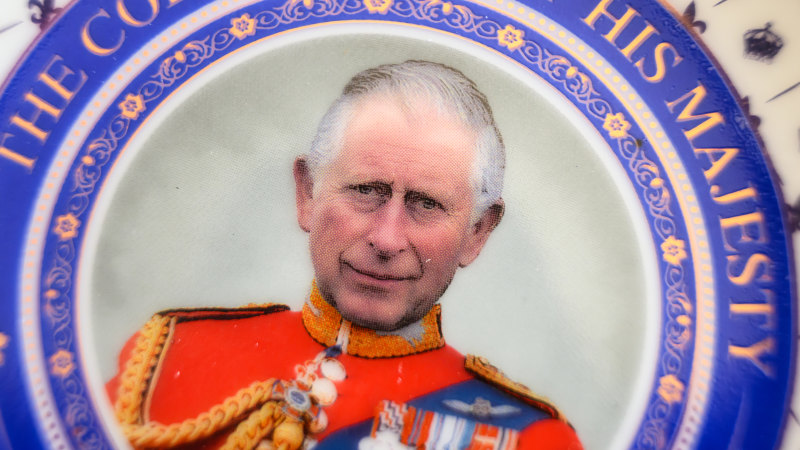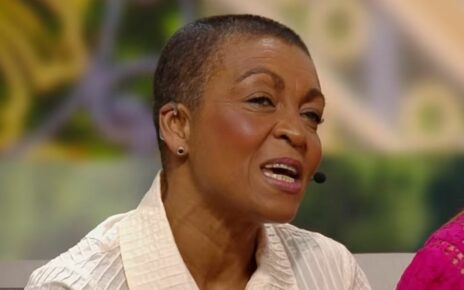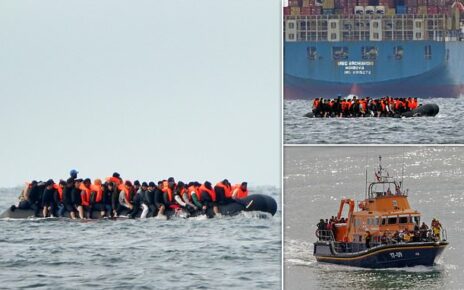Save articles for later
Add articles to your saved list and come back to them any time.
London: Back in June 1953 – 70 years ago, next month – the coronation of Queen Elizabeth II served as an antidote to a decade of depression. War had scarred Europe, the blitz had left rubble strewn across London and rationing of food had pushed the most vulnerable into austere living conditions.
The impact of the 1953 coronation, an arcane blend of ecclesiastical tradition and quasi-divine power transference, was to light a spark in the spirit of a weary people, who stepped into the moment with a surprising but not unexpected sense of national pride.
The Mall outside Buckingham Palace in London.Credit: Getty
Seven decades later, the jigsaw pieces present a picture that is different, but somehow the same. There is no war, though there is the distant tremor of the Russian-Ukrainian conflict. And the rubble which is strewn across London comes not from destruction, but relentless construction.
The mood is optimistic, but national enthusiasm is ever so slightly muted. The weather forecast is for rain, with “sunny spells” though the second half of that sounds more like pure optimism as the days inch closer to hours. Still, they’re a tenacious lot, the Brits. You’ll see a sea of umbrellas long before you see empty streets.
In the afternoon sun-dappled streets of London, the only thing louder than the proclamation of “Vivat Rex!” – to be repeated three times, when St Edward’s Crown lands on King Charles III’s head this weekend – is the ker-ching of pounds. The streets are indeed crammed, mostly with shoppers.
Fortnum & Mason and Marks & Spencer are peddling coronation tins of all varieties: biscuits, tea, chocolates and other exotic treats. The Strand’s iconic stamp shop, Stanley Gibbons, has a window full of coronation-themed lickables. And Mayfair’s uber-cool Burlington Arcade has been laid with coronation-themed carpet from end to end. It ought to be: it is home to luxury horologer David Duggan and royal cobblers Crockett & Jones.
Royalists camp alongside the planned route of King Charles III near Buckingham Palace.Credit: Getty
Quaintly British bunting is starting to appear across streets. Just not every street. And not every neighbourhood either. Talking to people around London, from shopkeepers to taxi drivers, the conversations alternate between genuine enthusiasm for the event, and people who are barely aware anything is happening, let alone a coronation.
This is not to say London will not sparkle on the day. The manner in which the city and its people rallied around the 2012 Olympics was proof that the British have a powerful sense of place in their own story, and a rare ability to step up to and into the moment. During the London Games, the city shimmered. There is every reason to expect it will shimmer again.
But a coronation in a modern age is both a useful reminder of the importance of tradition in a culture that moves at a record pace towards abandoning such ceremonies and an anachronistic reminder that at the heart of that tradition is an institution that struggles most days to demonstrate its relevance, both to the wider community and to many of the micro-communities within it. As contradictions-in-terms go, it’s a whopper.
Trying to measure the buzz in the 21st century, too, is a curious exercise in understanding the passionate eccentricity of royalty enthusiasts, who are already lining the streets, and the necessities of modern national security, demonstrated by a substantial still unfurling police presence.
People take a selfie in front of a replica of the St Edward’s Crown.Credit: Getty
As the end of the week rolls in, the Mall, the tree-lined boulevard which connects Admiralty Arch at Trafalgar Square to Buckingham Palace’s main gates, has gone from a sparse crowd to a full-blown tent city. On Saturday, it will make up a significant piece of the coronation carriage route between the Palace and Westminster Abbey. Peppered around it are rapidly reproducing roadblocks and police checkpoints.
The good news for Australia’s restless republicans is that the crowds are not predominantly Antipodean. In fact, the bulk of the crowd is coming from the United States, according to travel industry data. (Didn’t anyone tell them about the American Revolutionary War and the Treaty of Paris?)
Australia is third on the list of coronation-bound arrivals, behind the US and India, and ahead of Canada and Italy. And all of that at a time when airfares are more than 20 per cent higher than they were this time last year.
Most of the coronation’s secrets have been shielded by the cover of darkness. During the day, the streets are packed with tourists and traffic. But at night the police cordons come down and thousands of coronation procession participants, including the Sovereign’s Escort of the Household Cavalry Mounted Regiment, have been rehearsing their moves.
Even Scotland’s legendary Stone of Scone was secretly whisked into London in the middle of the night, and has been installed in the Coronation Chair of St Edward.
Walking around central London, you see the police presence long before you start to pay attention to the crowds. Operation Golden Orb – who comes up with these names, really? – will put around 29,000 officers on the streets of London, in “one of the most significant and largest security operations” ever mounted by the London Metropolitan Police.
It is also a curious foreshadowing of the weekend when facial recognition technology will be deployed for the first time at a major event by the Met. It will be “focused on those whose attendance on coronation day would raise public protection concerns,” the Met says.
Pro-privacy campaigners disagree, describing it as “Orwellian technology [which] may be used in China and Russia but has no place on the streets of Britain”. Madeleine Stone, the legal and policy officer of Big Brother Watch says the tech “turns the public into walking ID cards”.
Six of the eight Windsor Grey horses which will pull the Gold State Coach in Hyde Park, central London, during a rehearsal for the coronation.Credit: Getty
All the security makes sense when you consider who is on the guest list: foreign heads of government, including British Prime Minister Rishi Sunak and Australian Prime Minister Anthony Albanese, heads of state, crowned (and uncrowned) heads of the royal houses of Europe, US first lady Jill Biden and a splash of more run-of-the-mill celebrities such as singer Lionel Richie, David and Victoria Beckham and even Bear Grylls, in his capacity as Chief Scout. “Dib dib” indeed.
You can add to that the greatest gathering of the who-used-to-be-who and the what’s left of Debrett’s Peerage the British aristocracy since … well, Elizabeth’s 1953 coronation. Mostly that means the grace-and-favour second tier royals, including Prince Andrew (but no Fergie), Prince Harry (but no Meghan), the Gloucesters, the Kents, Princess Margaret’s family, and the last of the true blue-blooded old guard, Elizabeth’s cousin Princess Alexandra, The Honourable Mrs Ogilvy.
The sensibly trimmed guest list – 2300, down from the 8000 who attended Queen Elizabeth II’s coronation in 1953 – also includes foreign royals, such as King Willem-Alexander and Queen Maxima of the Netherlands, Queen Margrethe II, Crown Prince Frederik and Australian-born Crown Princess Mary of Denmark, King Abdullah II and Queen Rania of Jordan, Queen Anne-Marie of Greece, Prince Albert and Princess Charlene of Monaco and the Sultan of Brunei.
It even includes Australian singer Nick Cave who declared himself to be “not so spectacularly incurious about the world and the way it works, so ideologically captured, so damn grouchy, as to refuse an invitation to what will more than likely be the most important historical event in the UK of our age”.
All of them have come to bear witness to a coronation that is, in principle at least, mostly performative, like the opening night of Charles & Camilla: A Royal Musical. King Charles III actually won his crown the moment his mother drew her last breath, such is the manner of these things. Which is why they say, “The Queen is dead, long live the King.”
But with props like the coronation regalia and storied weapons like The Sword of Temporal Justice, the coronation is not mere theatre. It’s an exotic mixture of clerical ballyhoo and bejewelled pantomime, set to an impenetrable and long script which culminates in the taking of coronation oaths and the placing of St Edward’s Crown on King Charles’ head. Think of it as the G-rated Game of Thrones.
It even has an 11 o’clock number – the show-stopper which comes late in the second act – in the form of Handel’s Zadok the Priest, composed in 1727 for the crowning of King George II and a favourite for state occasions and coronations the world around. Royalty boffins will also note it was performed at Our Mary’s wedding to Prince Frederik of Denmark back in 2004.
So, does any of this really matter? Even though many anticipated a wave of post-Elizabeth II republicanism, support for the monarchy, at least on its home soil, seems pretty solid, if not wholly sober. (The British Beer and Pub Association estimates 62 million pints will be poured across the three-day weekend.)
A somewhat more serious poll from YouGov reported 62 per cent of the country supported keeping the monarchy and its sometimes dithering head, King Charles III. Bundle the flag-waving majority in with the not-sure-either-way (totalling about 12 per cent) that leaves only about a quarter of the country interested in rebooting the system.
The owners of Val’s English Tea and Pie Shop hang a commemorative flag as they decorate the window ahead of the coronation of King Charles III. Credit: AP
In truth, most are focused on the theatre, pomp and pageantry. And like most big-budget stage shows, with only hours now until the curtain goes up on opening night, it comes after a full dress rehearsal, held on Thursday night, London time, and attended by King Charles, Queen Consort Camilla, the Princess Royal, and the Prince and Princess of Wales and their three children. (No sign of Harry, though. Don’t ask. It’s a whole other story.)
In that sense, perhaps the coronation is an analogy for the institution of royalty itself: superficially eccentric at first glance, but somehow central to Britain’s national identity at the same time. It is spiritual and temporal. And a symbol that in a world of constant change, both the institution and the coronation ritual which cloaks it in mystique, remain fixed and unmoving.
Get a note directly from our foreign correspondents on what’s making headlines around the world. Sign up for the weekly What in the World newsletter here.
Most Viewed in World
From our partners
Source: Read Full Article







